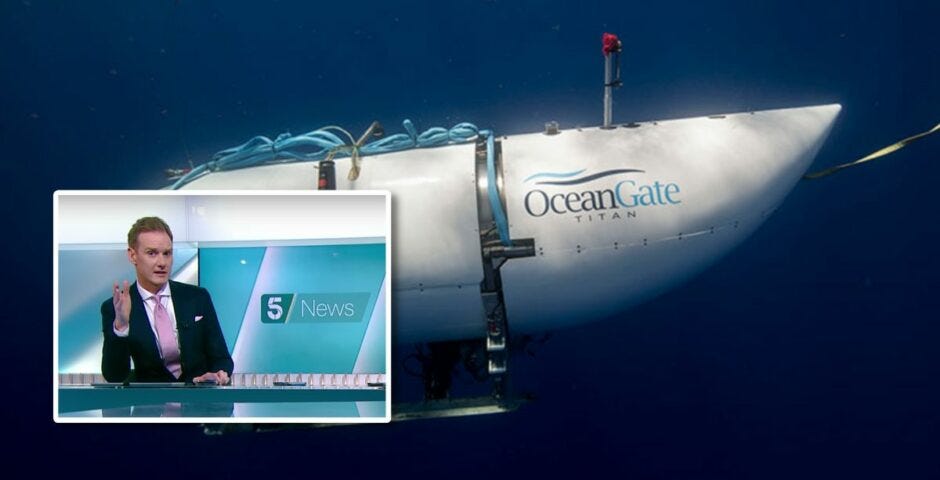Weekly Trends: Submersible, Boris & Orcas
PLUS, Mark's thoughts on Harry & Meghan's Spotify drama
Before diving into The Trends, check out Mark’s latest post discussing the challenges facing the Harry and Meghan brand after Spotify ended their partnership and the potential financial implications - raising doubts about their desired status. Despite generating attention, limited control over the narrative should concern them, and establishing their brand identity and overcoming challenges is critical. A strong PR team and embracing humility and collaboration are essential to rebuilding their image and future success.
A News Story of Titanic Proportions
Not since the 2018 rescue of a children’s football team from a cave in Thailand has a news story gripped the world quite like the Ocean Gate Titan submersible. Last evening’s tragic news that all five people on board had been declared dead in a probable implosion of the submarine brings to a close a week of breathless media speculation, memeification, and (let’s be honest) exaggeration. Unsurprisingly every major news outlet covered all the twists and turns of the story, with some distastefully approaching it like a football Deadline Day broadcast, with a ‘live’ ticking clock symbolising the crews dwindling oxygen levels.
This story succeeded in bringing in the media’s most valuable asset – eyeballs. Even at a glance it has everything required of a Hollywood blockbuster – the world’s most famous shipwreck, a single-minded billionaire, a race against the clock and mysterious circumstances. Add to that mix cameos from Cardi B, James Cameron and an Only Fans sideshow, and you’ve got a story worth its weight in gold. The ship (or submarine?) that launched a thousand memes.
But of course, like so much other internet discourse, we seem to have forgotten the human element here amongst all the noise. Four families are now grieving a shocking loss on the public stage whilst being bombarded with conspiracy theories and careless swipes at the victims that stories of this size so often illicit. Some of the criticism levelled here does have merit. Mid-week, outlets like Diet Prada started to point out the painful dichotomy of the large-scale response and public uproar surrounding the Ocean Gate Expedition compared to the previous week’s muted response to the death of hundreds of migrants in a shipwreck off the Greek coast. Refugee charity Choose Love harnessed this narrative more humanely and effectively with a frequently reshared post stating, "Everyone deserves to be saved at sea.”
The story may have now reached its tragically inevitable conclusion, but the media noise is bound to continue until public fascination wanes in the way it does so quickly these days. Keen to catch this particular wave, Channel 5 wasted no time rushing out a full documentary on the subject, fronted by Dan Waker, which aired on Thursday, 22nd June. Smart business? Probably. Sensitive? Not so much.
Only Six Allies Remain for Boris Johnson
The drawn-out Partygate saga is finally over. MPs have backed the damming report that found Boris Johnson deliberately lied to parliament and misled MPs over lockdown parties. The Commons overwhelmingly voted to support the 90-day suspension and removal of Johnson’s parliamentary pass. Hundreds abstained on the vote, hoping to escape the wrath of pro-Boris supporters. However, six voted against it, making up Boris’s tiny contingent of supporters.
Johnson’s downfall is a remarkable turn of events for a prime minister who once led the country with a historic election victory. However, the tables have since turned, and the erosion of support for Johnson has been so profound that he struggles to gather enough backing to field a football team. The result reflects the profound loss of faith in the disgraced former PM and illustrates how much his political influence has crumbled.
The 90-day suspension is a symbolic formality as Boris preemptively stepped aside. Losing his parliamentary pass signifies a notable shift in his status - the next time he’s spotted in parliament, he’ll be an ordinary citizen, queuing for a security pass with the local constituent tours and visitors, and babysat around the estate in a dramatic fall from grace.
The Orca Renaissance
As a society, our attention and concern for killer whales last peaked around Shamu, the beloved star of Florida’s Disney SeaWorld, who dragged and scalped its trainer underwater during a petting session in front of an audience of children munching on whale-shaped pretzels. Since that unfortunate episode in 2010, these emphatic aquatic predators have gone under the radar, leaving the stage for the more conventional Egyptian coast shark attacks. Thankfully, the 2023 return of the orca has a slightly less gory feel to it. However, the recent tragic Titanic submarine accident contributed to a growing feeling of uneasiness about oceanic depths.
In May this year alone, groups of orcas attacked twenty boats and vessels near Gibraltar and Portugal. Just this week, a killer whale has rammed into a boat in UK waters. The story has captured the attention of people worldwide because orcas have never been known to attack or interact with boats or humans in the wild. The current dominant theory behind this change in behaviour gives this story a Shakespearean twist: apparently a female orca prominent in its pack had been injured by a boat, and she had since been teaching her kind to attack various vessels in an act of retaliation. The new trend has inspired many a meme on one side and energised animal rights activists on the other. Such an absurd and unexpected new story feels fitting at a time when the socioeconomic and political tensions on land have become overwhelming to the point where fantastical feelings of wonder and obscure threat provide a good dose of escapism.






